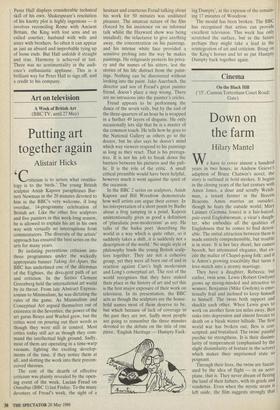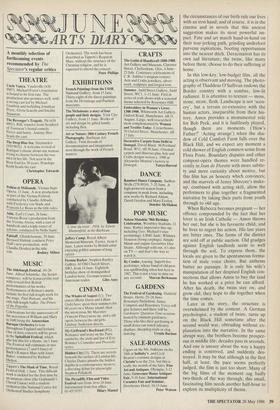Cinema
On the Black Hill ('15', Cannon Tottenham Court Road; Gate)
Down on the farm
Hilary Mantel
We have to cover almost a hundred years in two hours; in Andrew Grieve's adaption of Bruce Chatwin's novel, the story is outlined in bold strokes. It begins in the closing years of the last century with Amos Jones, a dour and scruffy Welsh- man, a tenant farmer in the Brecon Beacons. Amos marries an outsider, though he fears the outside world; Mary Latimer (Gemma Jones) is a fair-haired, pale-eyed Englishwoman, a vicar's daugh- ter, who embodies all the qualities of Englishness that he comes to find detest- able. The initial attraction between them is made entirely comprehensible, but trouble is in store. It is her lacy shawl, her cameo brooch, her attenuated elegance, that ex- cite the malice of Chapel-going folk; and it is Amos's growing irascibility that turns a love-match into a stormy marriage.
They have a daughter, Rebecca; but earlier, twin sons. Lewis (Robert Gwilym) grows up strong-minded and attractive to women; Benjamin (Mike Gwilym) is emo- tionally frail and inclined to keep himself to himself. The twins both support and shackle each other. When Lewis goes to work on another farm ten miles away, Ben sinks into depression and almost freezes to death on a bleak winter hillside. The first world war has broken out; Ben is con- scripted, and brutalised. The twins' painful psychic tie strengthens. It is their dissimi- larity of temperament (emphasised by the slight dissimilarity of feature in the actors) which makes their imprisoned state so poignant.
Through their lives, the twins are fascin- ated by the idea of flight — in an aero- plane, that is. They never dream of fleeing the land of their fathers, with its griefs and vendettas. Even when the mystic strain is left aside, the film suggests strongly that the circumstances of our birth rule our lives with an iron hand; and of course, it is in the cinema and in novels that this ancient suggestion makes its most powerful im- pact. Fate and art march hand-in-hand on their tear-jerking path, grinding underfoot parvenu aspirations, booting opportunism into the nearest ditch. Deracination has its own sad literature; the twins, like many before them, choose to do their suffering at home.
In this low-key, low-budget film, all the acting is observant and moving. The photo- graphy of Thaddeus O'Sullivan endows the Border country with a sombre, low-lit radiance. It is attentive to texture — moss, stone, straw, flesh. Landscape is not 'scen- ery', but a terrain co-extensive with the human actors, inseparable from their his- tory. Amos provides a monumental role for Bob Peck, and it is faultlessly played, though there are moments ('How's Father?' Acting strange') when the sha- dow of Cold Comfort Farm falls over the Black Hill, and we expect any moment a cold shower of English common sense from Flora Poste. Boundary disputes and other compost-opera themes were handled re- cently in Jean de Florette with more subtle- ty and more curiosity about motive, but this film has an honesty which convinces; and the marvels of Jenny Shircore's make- up, combined with acting skill, allow the performers to glue together a fragmented narrative by taking their parts from youth through to old age.
When Rebecca becomes pregnant — her offence compounded by the fact that her lover is an Irish Catholic — Amos throws her out; but she is his favourite child, and he lives to regret his action. His last years are bitter ones. The farms of the district are sold off at public auction. Old grudges against English landlords seem to well through the soil. To express them, the locals are given to the spontaneous forma- tion of male voice choirs. But anthems butter no parsnips. It is only his wife's manipulation of her despised English con- nections that allows Amos to buy the land he has worked at a price he can afford. After his death, the twins stay on, and grow old; they hope to die together when the time comes.
Later in the story, the structure is overwhelmed by the content. A German psychologist, a student of twins, turns up on the Black Hill sometime after the second world war, obtruding without ex- planation into the narrative. In the same abrupt way, the brothers become prosper- ous in middle life; decades pass in seconds. And one is uneasy about the way a happy ending is contrived, and suddenly des- troyed. It may be that although in the first half, at least, the pace seems perfectly judged, the film is just too short. Many of the big films of the moment sag badly two-thirds of the way through; this small, fascinating film needs another half-hour to explore its multiplicity of theme.



















































 Previous page
Previous page